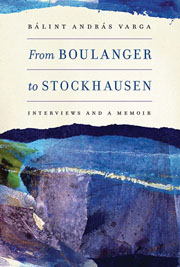Book contents
- Frontmatter
- Dedication
- Contents
- Foreword
- Acknowledgments
- Part One Interviews
- Part Two A Memoir
- Introduction
- Chapter 1 Ancestors
- Chapter 2 On Being Jewish
- Chapter 3 Growing Up in Postwar Socialist Hungary
- Chapter 4 Margit
- Chapter 5 Tapespondence
- Chapter 6 Birth and Demise of a (Counter)revolution: A Boy's-Eye View
- Chapter 7 Broadcasting 1
- Chapter 8 Broadcasting 2
- Chapter 9 Editio Musica Budapest
- Chapter 10 Interviewing: An Obsession
- Chapter 11 Ich war ein Berliner
- Chapter 12 Moving to Vienna
- Chapter 13 Universal Edition
- Chapter 14 Back Catalogue
- Chapter 15 The Psychology of Promotion
- Chapter 16 Farewell and After
- Notes in Retrospect
- Index
- Miscellaneous Endmatter
Chapter 15 - The Psychology of Promotion
from Part Two - A Memoir
Published online by Cambridge University Press: 05 January 2014
- Frontmatter
- Dedication
- Contents
- Foreword
- Acknowledgments
- Part One Interviews
- Part Two A Memoir
- Introduction
- Chapter 1 Ancestors
- Chapter 2 On Being Jewish
- Chapter 3 Growing Up in Postwar Socialist Hungary
- Chapter 4 Margit
- Chapter 5 Tapespondence
- Chapter 6 Birth and Demise of a (Counter)revolution: A Boy's-Eye View
- Chapter 7 Broadcasting 1
- Chapter 8 Broadcasting 2
- Chapter 9 Editio Musica Budapest
- Chapter 10 Interviewing: An Obsession
- Chapter 11 Ich war ein Berliner
- Chapter 12 Moving to Vienna
- Chapter 13 Universal Edition
- Chapter 14 Back Catalogue
- Chapter 15 The Psychology of Promotion
- Chapter 16 Farewell and After
- Notes in Retrospect
- Index
- Miscellaneous Endmatter
Summary
The psychology of promotion is closely linked to an aspect of the psychology of creativity, or rather, the psychology of creators. Creative artists, in whatever field, could not exist without their promoters (agents, managers, publishers, gallery owners): promoters are their link to the outside world, for which they create in the first place.
I am sure that the relationship between Picasso and Ambrois Vollard or Braque and Daniel-Henry Kahnweiler was basically similar to that between Emil Hertzka and Arnold Schoenberg or the American writer Carson McCullers and the publisher Houghton Mifflin, which discovered her talent and continued to publish her books.
Creators need someone they can trust—someone who understands and appreciates their art, who responds to new works intelligently and with empathy, who supports them in crises that are bound to befall those whose life centers on turning themselves inside out and placing their findings for all to view; creators need someone who paves the way for the encounter with those ready, even eager, to absorb newly created works of art, someone who brings the world to the artist and the artist to the world.
The promoter must be as selfless as the creator must needs be self-centered; both share a sensitivity without which creation and its promotion would be unimaginable. Under no circumstances can the promoter be a failed artist. He must be capable of vicarous joy: as I put it in an earlier chapter, he must experience his protégés' success as his own.
- Type
- Chapter
- Information
- From Boulanger to StockhausenInterviews and a Memoir, pp. 370 - 374Publisher: Boydell & BrewerPrint publication year: 2013



